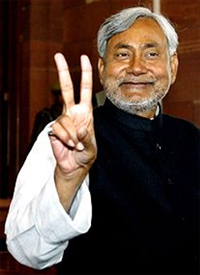Oct 20, 2025
Oct 20, 2025
 There seem to be two reasons why Nitish Kumar registered such a spectacular victory in the Bihar assembly elections. One reason is obvious. The other reason is obscure, not generally perceived. The obvious reason is of course the Bihar government’s stress on better governance and development which brought it good results. But earlier governments providing good governance have not fared like this. The landslide victory merits a closer look to decipher its causes. There is most likely a hidden cause that needs to be appreciated. In my view this election was also a vote against caste based reservations. Let us see how.
There seem to be two reasons why Nitish Kumar registered such a spectacular victory in the Bihar assembly elections. One reason is obvious. The other reason is obscure, not generally perceived. The obvious reason is of course the Bihar government’s stress on better governance and development which brought it good results. But earlier governments providing good governance have not fared like this. The landslide victory merits a closer look to decipher its causes. There is most likely a hidden cause that needs to be appreciated. In my view this election was also a vote against caste based reservations. Let us see how.
25-Nov-2010
More by : Dr. Rajinder Puri